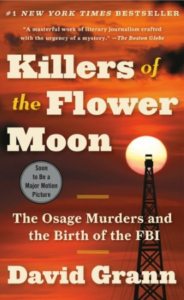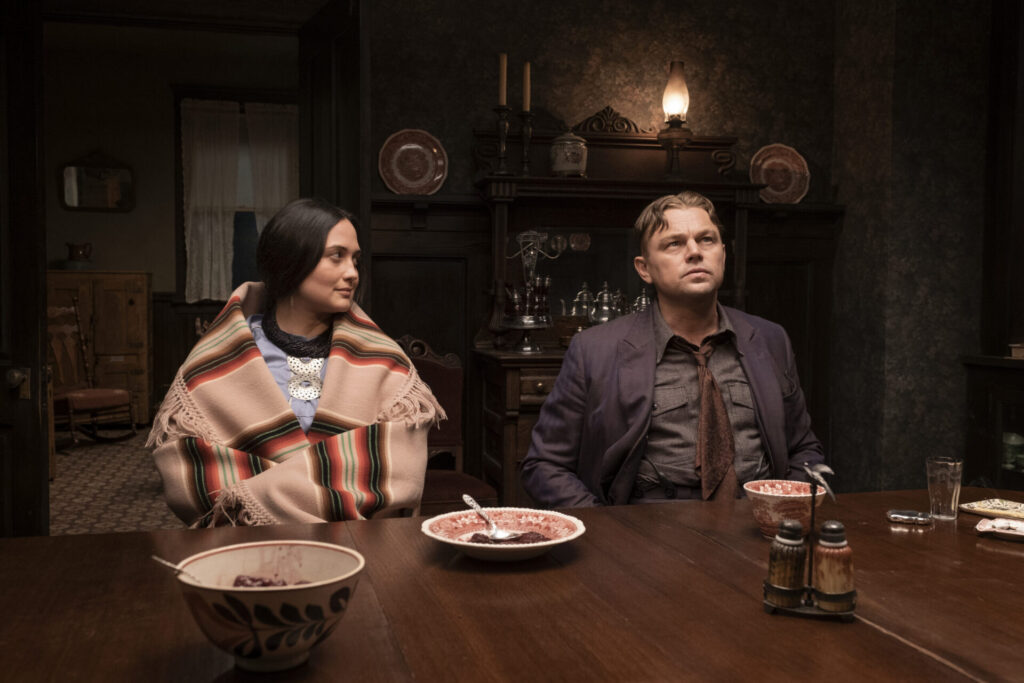 “In May, when coyotes howl beneath an unnervingly large moon, taller plants, such as spiderworts and black-eyed Susans, begin to creep over the tinier blooms, stealing their light and water. The necks of the smaller flowers break and their petals flutter away, and before long they are buried underground. This is why the Osage Indians refer to May as the time of the flower-killing moon.”
“In May, when coyotes howl beneath an unnervingly large moon, taller plants, such as spiderworts and black-eyed Susans, begin to creep over the tinier blooms, stealing their light and water. The necks of the smaller flowers break and their petals flutter away, and before long they are buried underground. This is why the Osage Indians refer to May as the time of the flower-killing moon.”
This is from “Killers of the Flower Moon: the Osage Murders and the Birth of the FBI,” written by David Grann. A poetic paragraph, but a brutal story soon followed. Mr. Grann is an exceptional writer and researcher; meticulous in his telling of this tale of ultimately unsurprising mistreatment of indigenous people. The book, published in 2017 and given to me shortly after, was an incredibly difficult read.
I am a mixed-race woman, and was adopted by a White couple. I’ve written significantly of personal facts regarding my adoption back in 1960s Kansas. My birth mother was Indigenous from Oklahoma, and came across the Oklahoma/Kansas border to the small city of Wichita, KS to have me. Wichita is startlingly close to “Indian Country” in Oklahoma, including the Osage Reservation, which made the book very personal for me. I felt compelled to revisit the book before seeing the movie it was based on, “Killers of the Flower Moon,” directed by Martin Scorsese, starring Leonardo DiCaprio and Lily Gladstone.
While I LOVE Martin Scorsese, and Leonardo DiCaprio, and usually find their film-making efforts to be exemplary, I felt very differently about “Killers of the Flower Moon.” Hollywood whitewashes nearly everything it touches, and this movie was no exception. With a White director, a White star, four White producers, and two White screenwriters outweighing the one Native lead, one First Nations composer (Robbie Robertson), and Osage “consultants and cultural advisors.” Angela Aleiss, author and Columbia University doctorate film scholar, noted that “no Native American is credited as being involved in the movie’s screenwriting, production or directing creative processes. This is an ongoing problem.” (https://www.msnbc.com/opinion/msnbc-opinion/killers-flower-moon-native-american-true-story-told-white-people-rcna121491)
Devery Jacobs, an Indigenous actress of Mohawk heritage, called the film “painful, grueling, unrelenting and unnecessarily graphic” (https://www.vanityfair.com/hollywood/2023/10/reservation-dogs-star-devery-jacobs-wasnt-a-fan-of-killers-of-the-flower-moon), and I agree. The movie brought forth the question, should the racism and genocide directed toward Native peoples be, once again, turned into “entertainment,” allowing the suffering of an entire ethnicity be used to line people’s pockets?

